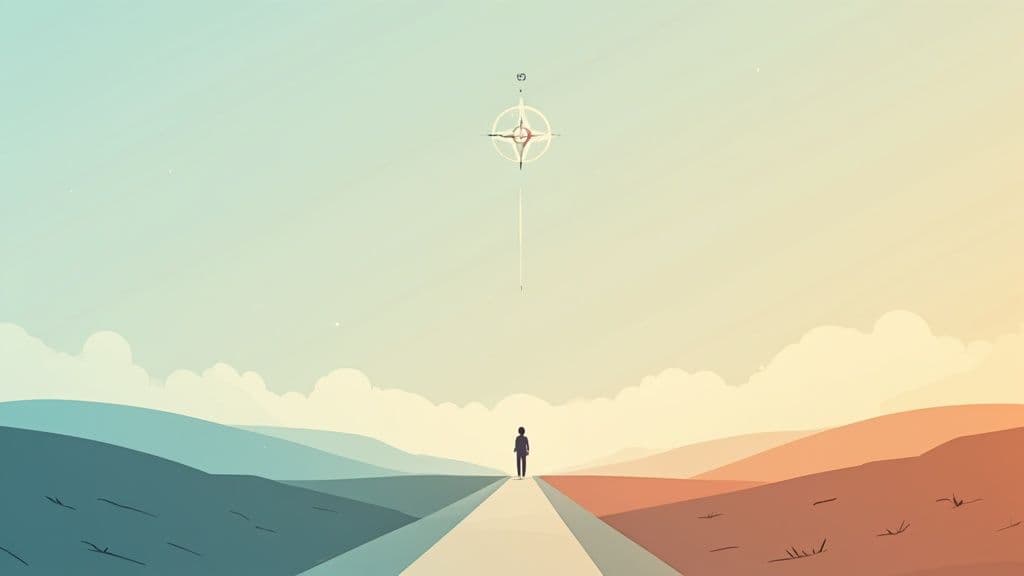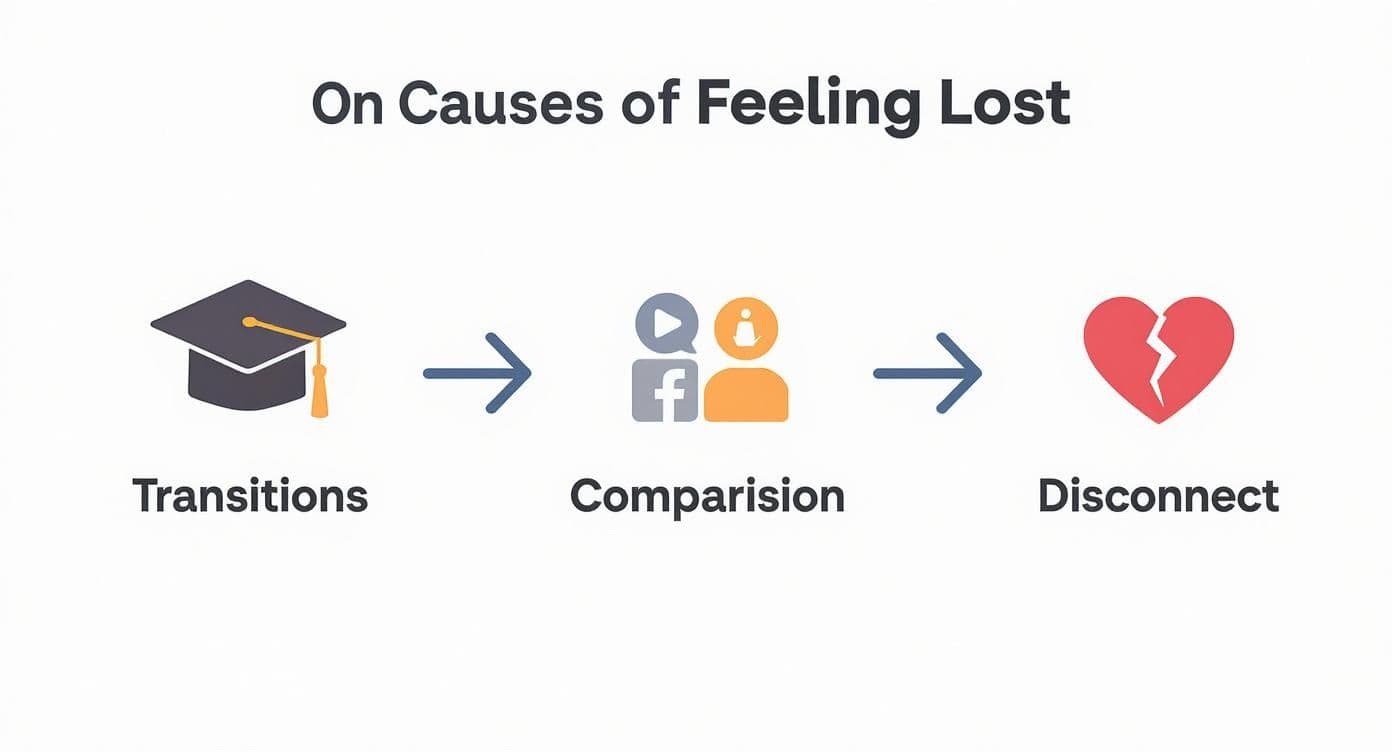That drifting, hollow sensation isn’t proof you’ve failed, it’s a signal. Asking “Why do I feel lost in life?” is the first honest step. This guide shows common causes, evidence-backed context, and simple steps you can start today to regain purpose and momentum.
November 14, 2025 (3mo ago) — last updated February 13, 2026 (19d ago)
Why Do I Feel Lost in Life? 8 Steps to Find Direction
Feeling lost? Discover causes, evidence-backed tips, and simple daily steps to regain purpose, clarity, and momentum.
← Back to blog
Why Do I Feel Lost in Life? 8 Steps to Find Direction
Summary: Feeling lost? Learn the real causes, evidence-backed insights, and practical steps to regain purpose, clarity, and momentum in everyday life.
Introduction
That drifting, hollow sensation isn’t proof you’ve failed, it’s a signal. Asking “Why do I feel lost in life?” is often the first honest step toward change. This guide explains common causes, evidence-backed context, and clear, practical steps you can start today to regain direction, purpose, and momentum.
You’re Not Alone in Feeling Lost
If you landed here, something about your life feels off. Maybe a career that once felt meaningful now feels flat. Maybe relationships don’t feel as deep. Or you wake up with a quiet ache, a sense that something essential is missing.
This experience is common, but it can feel isolating. Feeling lost isn’t a flaw, it’s an invitation to pause and reassess. Think of it as an internal signal telling you the map you’ve been following no longer fits the territory.
What We Will Explore
- The roots of feeling lost: psychological triggers, social pressures, and internal conflict.
- A practical framework to gain clarity using life-number insight and self-reflection.
- Actionable steps you can start today, from tiny daily habits to larger life shifts.
“Feeling lost isn’t about not knowing where you’re going; it’s about not feeling like yourself on the journey you’re currently on.”
This guide draws on Dan Millman’s work in The Life You Were Born to Live and tools available through the Life Purpose App to give you a clearer, structured way to understand your strengths and challenges.
Why You Feel Adrift
That nagging sense of being lost is often a real signal: your life no longer matches the person you’re becoming. Major life changes — graduating, switching careers, ending a relationship — remove familiar roles and leave you asking, “Who am I now?”
Social media amplifies that noise by exposing curated highlights, which can make your real, messy life feel inadequate. Evidence shows limiting social-media use can decrease loneliness and depressive symptoms for some people2.
The Disconnect Between Life and Values
Often the deepest cause is living a life that clashes with your core values. Values are your internal compass. When your daily actions — the job you do, the people you spend time with, how you use your energy — point away from that compass, you’ll likely feel drained, inauthentic, and unmotivated.
Common signs of internal conflict:
- Lack of motivation: You can’t get excited about things that used to matter.
- Constant exhaustion: You feel drained even after rest because you’re upholding a life that doesn’t fit.
- A sense of inauthenticity: It feels like you’re playing a role instead of living your own life.
Typical Triggers for Feeling Lost
| Trigger Category | Examples | How It Contributes |
|---|---|---|
| External pressures | Social comparison, family expectations, career pressure | Creates a gap between your reality and an imagined ideal, leading to self-doubt. |
| Life transitions | Graduation, job loss, moving, breakups, parenthood | Removes familiar identities and structure, forcing identity re‑negotiation. |
| Internal misalignment | Ignoring intuition, work that violates values, neglecting creativity | Produces chronic unease and a sense that something’s off. |
| Mental & emotional health | Burnout, anxiety, depression, grief, chronic stress | Clouds judgment, drains energy, and makes it hard to see a clear path forward. |
Recognizing which triggers apply to you shifts the question from “What’s wrong with me?” to “What’s trying to get my attention?”
The Mental Health Context
Sometimes feeling lost is tangled with deeper mental-health challenges. Over one billion people worldwide live with a mental-health condition, which can worsen isolation and confusion when support is scarce1. That’s why getting help matters: feeling adrift isn’t a personal failure, it’s a human experience that benefits from attention and care.
A Practical Framework: Finding Your Unique Life Number
A structured lens can turn vague unease into clear insight. Dan Millman’s system in The Life You Were Born to Live uses numbers from your birth date to describe innate strengths, recurring challenges, and core purpose. It’s a tool for self-understanding, not fortune-telling.
How to Calculate Your Life Number
Add the digits of your birth date. For example, 11/24/1986:
1 + 1 + 2 + 4 + 1 + 9 + 8 + 6 = 32
That two-digit number — 32 — is used as 32/5 in Millman’s system. The full combination gives a richer picture than a single digit. For a walkthrough and examples, see the Life Purpose App blog for a step-by-step guide.
What the number does is give you a map for self-reflection. It highlights recurring patterns and helps explain why certain challenges keep showing up.

How to Start Finding Direction Today
Clarity rarely arrives fully formed. It’s built through small, deliberate actions. Here are practical, realistic steps to move from confusion to momentum.
1. Start a Conversation with Yourself
Turn down the outside noise and listen. Journaling for five minutes a day can reveal what energizes you versus what drains you. Try one prompt each day:
- What made me feel energized today?
- If I couldn’t fail, what would I try?
- When did I last feel completely like myself? What was I doing?
A simple personal-development plan can help turn these insights into goals and experiments. Use the Life Purpose App blog template to structure your plan.
2. Experiment with Curiosity
Treat this time as a series of low-stakes experiments. Take a class, volunteer, read outside your usual interests. The point is to gather data about what lights you up.
Clarity isn’t found by thinking harder, it’s created by doing. Consider short courses, community groups, or volunteering as ways to test interests while meeting people.
3. Take Courageous Action and Seek Support
If feeling lost is entangled with anxiety, depression, or burnout, reach out. Therapy, coaching, or a trusted friend can offer perspective and accountability. Psychotherapy and evidence-based talk therapies are effective for many people working through difficult transitions3.
Support can also include community: groups, classes, or volunteering where you meet people while exploring interests.
Embracing the Journey with Self-Compassion
Finding your way isn’t a race. The most important tool is simple kindness toward yourself. Feeling lost is an opportunity for exploration, so treat yourself like an explorer in new territory.
Shift from Failure to Exploration
No one has everything figured out. Letting go of the pressure to have a perfect plan frees you to try, fail, and learn. Start celebrating small wins: journaling for five minutes, trying a new recipe, or showing up to a class.
Practices to support this mindset:
- Celebrate small wins regularly.
- Practice patience, growth takes time.
- Embrace uncertainty as an opening to new possibilities.
Grounding practices like mindfulness can help quiet the anxious mind and make space for clearer decisions. Even a few minutes of focused breathing can bring surprising clarity. See our Mindfulness Guide for practical exercises.
“Being lost can mean you’ve outgrown your old map and are ready to draw a new one based on who you’re becoming.”
The Power of Being Present
Much of the anxiety that accompanies feeling lost comes from worrying about the future or replaying the past. Mindfulness, paying attention to the present without judgment, creates space to make clearer choices now.
Quick Questions & Answers
Q: Is it normal to feel lost?
A: Yes. It’s a common, human experience and often a sign that you’re outgrowing an old identity. Use the discomfort as a prompt to explore what’s next.
Q: How long will this last?
A: There’s no set timeline. The feeling can be short-lived after a transition or a longer season of introspection. Leaning in with small steps speeds the process.
Q: What’s one thing I can do right now?
A: Grab a notebook and write for five minutes. Free-write whatever comes up. That simple act creates space between you and your feelings and starts a conversation with yourself.
Concise Q&A (Bottom-Line Answers)
Q: What causes feeling lost?
A: Major life changes, social comparison, and living out of alignment with your values are common causes; mental-health challenges can intensify it1.
Q: How can I get unstuck quickly?
A: Start with small experiments: five minutes of journaling, a new class, or a short volunteer shift to gather data about what energizes you.
Q: When should I seek professional help?
A: If feelings of being lost come with persistent sadness, anxiety, or loss of function, reach out to a therapist or mental-health professional. Evidence-based therapies can help3.
Here at Life Purpose App, we help you decode your unique path using insights from Dan Millman’s The Life You Were Born to Live. Explore how your life number might clarify your next steps and turn confusion into confidence. Learn more at https://lifepurposeapp.com.
Discover Your Life Purpose Today!
Unlock your true potential and find your life’s purpose.
